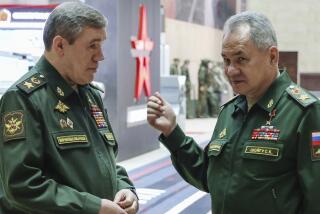Iraq Troops May Face War Crimes Trials : Atrocities: Reports coming out of Kuwait have increased pressure on the allies to put soldiers as well as Saddam Hussein in the dock.
- Share via
WASHINGTON — In the face of increasingly lurid stories of Iraqi atrocities in Kuwait, the United States and its Arab allies are coming under increasing pressure to put Iraqi soldiers, as well as their leader, Saddam Hussein, on trial for war crimes, officials say.
With tens of thousands of Iraqi troops already being held as prisoners of war, experts say they are sure that at least some of the soldiers went beyond the bounds of permissible military action.
A special Pentagon legal team already is collecting evidence to help separate alleged war criminals from ordinary soldiers.
Although most earlier talk of war crimes centered on Hussein himself, officials now say he is certainly not the only Iraqi war criminal. They say that even if Hussein eludes capture, many lesser offenders either are--or soon will be--in allied custody.
In Riyadh, Lt. Gen. Prince Khalid ibn Sultan, the top Saudi commander, said Monday that he is willing to let the Iraqi people deal with Hussein but will seek punishment for those troops who have killed, tortured and raped Kuwaitis during the occupation.
“I’m talking about the people in the city of Kuwait, I’m talking about the people who are murdering children,” Khalid said. “There’s horrible things going on. I hate to say it, but there is killing people by axes. . . . They rape females, cut them, certain parts of them, and hang them in every street.”
At the Pentagon briefing Tuesday, Rear Adm. John (Mike) McConnell said that “there’s been some corroborating information” to Khalid’s charges. “As we move closer we’re probably going to find that out,” McConnell said.
Lt. Gen. Thomas W. Kelly added that there has “not yet” been any independent corroboration of killings that were reported by Kuwaiti resistance.
White House Press Secretary Marlin Fitzwater said no decisions on war crimes trials will be made until the war is over, although “we continue to keep track of evidence and so forth that would be used for that purpose.”
A Pentagon official said the allies last weekend distributed pamphlets warning Iraqi troops that they would be held personally responsible for the use of chemical weapons and that even a private who loads a chemical round into an artillery piece could be brought to trial.
The official said that some prisoners of war may be tried by courts in Kuwait and that others may be turned over to special international tribunals.
“The army will do the investigation, but the ultimate decision will be made by the President and other nations involved,” the official said.
Even if no trials occurred now, the information could be submitted to the United Nations “so that if Saddam survives he could never leave Iraq” without facing possible arrest, the official added.
David J. Scheffer, an international lawyer on the staff of the Carnegie Endowment for International Peace, said the pressure to prosecute Iraqi war criminals is certain to build as the ground offensive goes on.
“When we were only talking about the withdrawal of the Iraqi army from Kuwait, apprehending Iraqi officials and soldiers was going to be very difficult, so it was much more of a theoretical discussion,” Scheffer said.
“Now we are talking about the encirclement and surrender of the Iraqi army,” he continued. “We will certainly capture a large number of Iraqi military officials who will be implicated in the commission of war crimes. This will increase pressure to prosecute them.”
Nevertheless, there is no question that Hussein is the man whom most Americans and their Arab allies want to bring to trial.
This may be difficult because, as State Department spokeswoman Margaret Tutwiler reiterated earlier this week, U.S. war aims do not call for “the removal of Saddam Hussein” from political power. Even so, the Pentagon is carefully compiling evidence against the Iraqi president.
“It’s like he talked to an international lawyer every morning and asked, ‘What haven’t I done yet?’ ” the Defense Department official said. “It’s almost like he has a checklist of crimes he wants to commit. He has a blatant disregard for international law or common decency that he has manifested during this campaign.”
Pentagon officials said Hussein “may have imprisoned and killed thousands” during his reign of terror.
“Executions have been going on on a daily basis since Aug. 3,” one said. “This is not something that started and then stopped and started again. He has been attempting to destroy any vestige of Kuwait, including its citizens.”
The concept of war crimes trials goes back at least to the middle of the last century. Such trials took place after the U.S. Civil War and the Crimean War.
Allied forces filed thousands of war crimes charges against German forces after World War I but, on the basis of a postwar agreement, the cases were tried in German courts. Most defendants were either acquitted or sentenced to relatively short prison terms.
After World War II, the victorious allies created special tribunals at Nuremberg and Tokyo that tried the most important war criminals and executed many of them. In later years, German civil courts continued to try former Nazis.
In fact, about the only war crime Hussein and his henchmen have not committed, a U.S. official said, is Nazi-style medical experimentation.
More to Read
Sign up for Essential California
The most important California stories and recommendations in your inbox every morning.
You may occasionally receive promotional content from the Los Angeles Times.













